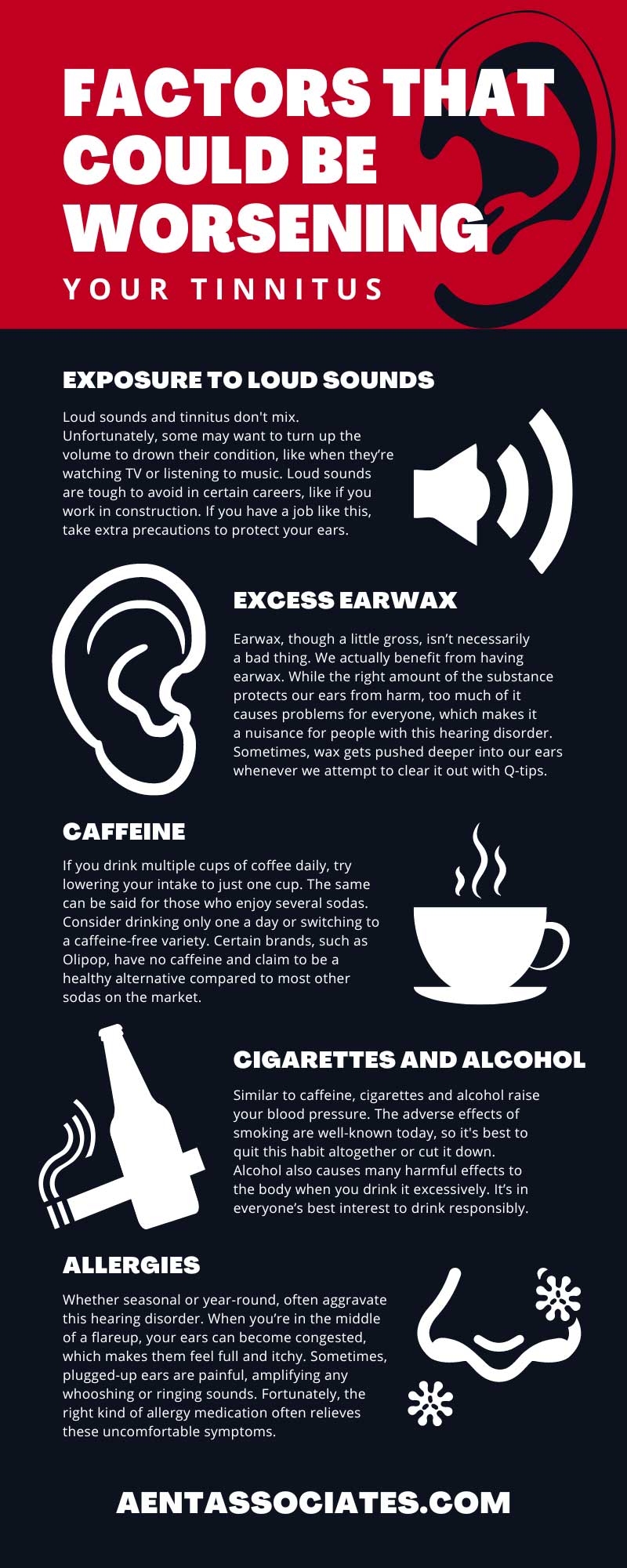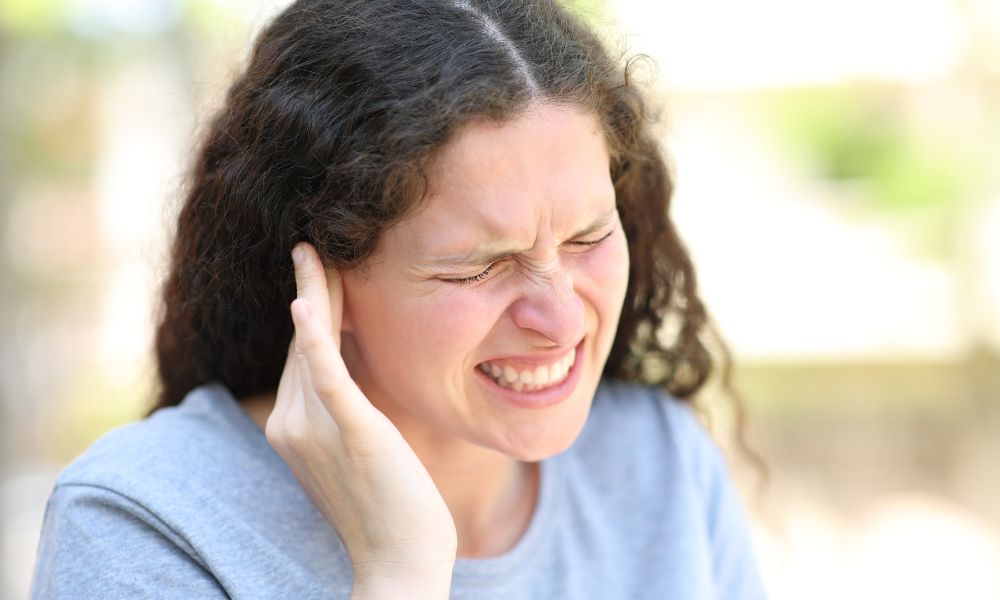Tinnitus is a condition that affects many people. Most describe it as a ringing in their ears, but symptoms can vary from person to person. This issue develops in people who have experienced hearing loss and occurs more often in aging adults. People with other health problems, such as Meniere’s disease or blood vessel disorders, can also develop tinnitus.
While there is no cure, there are ways to manage the condition. Alternatively, there are factors that could be worsening your tinnitus. We will closely examine what they are so that you can learn home remedies and pursue effective treatment options.
Before we begin, let’s go over tinnitus in greater detail to understand the condition better.
Understanding Tinnitus
While tinnitus often manifests as a ringing in the ears, some individuals hear other sounds.
Symptoms
The following noises are all possible symptoms of tinnitus:
- Humming
- Buzzing
- Whooshing
- Clicking
- Roaring
You may hear these sounds in each ear or only one of them. The tone can also differ depending on the person, so it could be a low or high pitch. Some people experience tinnitus chronically, while others only for short periods.
Types of Tinnitus
The different variations of this condition are:
- Subjective tinnitus
- Pulsatile tinnitus
- Objective tinnitus
Most people have subjective tinnitus, meaning they can only hear the sound in their ears. Pulsatile tinnitus is when the condition syncs up with your heartbeat. A healthcare professional can detect pulsatile tinnitus with a stethoscope. This variant falls into the objective category, which means that doctors can hear the sound with their equipment. Otherwise, only the person with the condition can detect it.
Factors That Irritate Tinnitus
Now that we have a deeper understanding of the auditory condition, let’s go over factors that could be worsening your tinnitus. These treatment options can provide you with relief. However, as always, seek out healthcare professionals if your tinnitus interferes with your everyday tasks.
Exposure to Loud Sounds
Loud sounds and tinnitus don’t mix. Unfortunately, some may want to turn up the volume to drown their condition, like when they’re watching TV or listening to music. Loud sounds are tough to avoid in certain careers, like if you work in construction. If you have a job like this, take extra precautions to protect your ears.
Hearing aids have the potential to alleviate tinnitus symptoms, so you may want to consider being fitted for one, especially if you also are hard of hearing.
Excess Earwax
Earwax, though a little gross, isn’t necessarily a bad thing. We actually benefit from having earwax. While the right amount of the substance protects our ears from harm, too much of it causes problems for everyone, which makes it a nuisance for people with this hearing disorder. Sometimes, wax gets pushed deeper into our ears whenever we attempt to clear it out with Q-tips.
So the next time you reach for the cotton swab, consider using a washcloth instead. It’s a simple process. Gently wet the towel with warm water and press it against your ear. If this doesn’t work, you can always try over-the-counter ear drops to help dissolve the wax. Visit your doctor if problems persist and you need the earwax professionally removed.
Caffeine
An overabundance of caffeine can worsen your tinnitus symptoms.
This stimulant works against you in a couple of different ways:
- It raises your blood pressure.
- It disrupt your sleep if you have caffeine too close to bedtime.
If you drink multiple cups of coffee daily, try lowering your intake to just one cup. The same can be said for those who enjoy several sodas. Consider drinking only one a day or switching to a caffeine-free variety. Certain brands, such as Olipop, have no caffeine and claim to be a healthy alternative compared to most other sodas on the market.
Cigarettes and Alcohol
Similar to caffeine, cigarettes and alcohol raise your blood pressure. The adverse effects of smoking are well-known today, so it’s best to quit this habit altogether or cut it down. Alcohol also causes many harmful effects to the body when you drink it excessively. It’s in everyone’s best interest to drink responsibly.
Your Mental Health
Your mental health may make your tinnitus worse if you experience the following:
- Stress
- Depression
- Anxiety
Stressful times can raise your blood pressure, which we’ve established as a factor that negatively impacts this condition.
If you suffer from depression, you fixate on external factors that make you unhappy. Since some can’t stand this hearing condition, the persistent noise in their ears will become amplified from their perspective. People with anxiety may have reoccurring thoughts about their tinnitus, which aggravates the hearing disorder, as their blood pressure or heart rate increases when they’re anxious.
Consider self-help remedies, such as deep breathing or mindfulness exercises, to help you when your mental health is suffering. If you’re going through a difficult time, a mental health professional may help, whether with talk therapy or prescribing medication.
Medications
However, please note that some medications make tinnitus symptoms worse.
Consider looking into your regimen if you take:
- Antidepressants
- Diuretics
- Anti-inflammatories
- Antibiotics
- Some over-the-counter medications
Your healthcare professional can help you determine if any of these drugs negatively impact your condition. Switching medications might help alleviate or eliminate your tinnitus if the medication originally caused it.
Allergies
Finally, allergies, whether seasonal or year-round, often aggravate this hearing disorder. When you’re in the middle of a flareup, your ears can become congested, which makes them feel full and itchy. Sometimes, plugged-up ears are painful, amplifying any whooshing or ringing sounds. Fortunately, the right kind of allergy medication often relieves these uncomfortable symptoms.
Consider taking over-the-counter allergy medications. If this doesn’t alleviate your allergies and tinnitus, we recommend you visit an allergy specialist near you to devise an effective treatment plan.
Allergy & ENT Associates provide professional audiology services that can help diagnose and treat tinnitus. We also are experts at treating allergies, asthma, and sinus disease. Visit us at our Cypress, TX, practice or one of our other four locations that specialize in providing audiology assistance. Call or book an appointment online today.



